|
|
|
Sort Order |
|
|
|
Items / Page
|
|
|
|
|
|
|
| Srl | Item |
| 1 |
ID:
120870


|
|
|
|
|
| Publication |
2013.
|
| Summary/Abstract |
In examining the diffusion of social and political phenomena like regime transition, conflict, and policy change, scholars routinely make choices about how proximity is defined and which neighbors should be considered more important than others. Since each specification offers an alternative view of the networks through which diffusion can take place, one's decision can exert a significant influence on the magnitude and scope of estimated diffusion effects. This problem is widely recognized, but is rarely the subject of direct analysis. In international relations research, connectivity choices are usually ad hoc, driven more by data availability than by theoretically informed decision criteria. We take a closer look at the assumptions behind these choices, and propose a more systematic method to asses the structural similarity of two or more alternative networks, and select one that most plausibly relates theory to empirics. We apply this method to the spread of democratic regime change and offer an illustrative example of how neighbor choices might impact predictions and inferences in the case of the 2011 Arab Spring.
|
|
|
|
|
|
|
|
|
|
|
|
|
|
|
|
| 2 |
ID:
120877
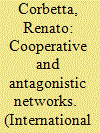

|
|
|
|
|
| Publication |
2013.
|
| Summary/Abstract |
In recent years (social) network approaches have been gaining ground in the field of international relations. Networks between states effectively explain patterns of international conflict and cooperation. One issue where conflict and cooperation converge-and where network analysis finds fruitful application-is the issue of third-party states' intervention in conflicts. This study investigates whether, and how, conflict expands in the international social space through the cooperative and antagonistic networks generated by states' supportive and oppositional interventions in international disputes. The study adopts a sociological theory of social units' interaction in the social space as a function of their multidimensional affinity to investigate further how such networks form. The hypotheses derived from this theoretical framework are tested using data on third-party non-neutral intervention in post-World War II militarized interstate disputes from Corbetta and Dixon (2005). Proximity in the international social space effectively predicts the creation of cooperative ties (supportive interventions) between states, while social distance predicts antagonistic ties (oppositional interventions).
|
|
|
|
|
|
|
|
|
|
|
|
|
|
|
|
| 3 |
ID:
120873


|
|
|
|
|
| Publication |
2013.
|
| Summary/Abstract |
The human security agenda, as currently operationalized by the majority of powerful states and institutions, exhibits a distinct liberal character, simultaneously contributing to and legitimizing the dominant liberal peacebuilding approach. As such, there has been a crowding out of alternative conceptions of human security, including those which focus on emancipation. This latter approach to human security offers a more transformative vision through its focus on issues such as hegemony, power, and freedom. Paths to such forms of human security have yet to materialize, largely due to the characteristics of a liberal-internationalist approach which has narrowed the political space in which challenges to the status quo can be imagined and realized. In its failure to allow for a genuine plurality of voices and in its insistence on creating false consensus, liberal peacebuilding blocks the emancipatory promise of a genuine shift from state to human security. A potential starting point for imagining alternatives to liberal peacebuilding and thus the creation of emancipatory forms of human security is to consider the role and possibilities for agonistic modes of politics and peacebuilding. Transforming inevitable differences that are part of human society into agonistic relationships-where differences exist and are negotiated among adversaries (as opposed to enemies)-opens up the political space required to challenge dominant liberal approaches to human security and enables a shift toward the emancipatory model.
|
|
|
|
|
|
|
|
|
|
|
|
|
|
|
|
| 4 |
ID:
120874
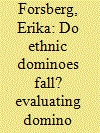

|
|
|
|
|
| Publication |
2013.
|
| Summary/Abstract |
There is a commonly expressed concern that granting territorial concessions to separatist groups may create "domino effects." However, although this statement is largely undisputed within political rhetoric, no firm conclusions have been provided in previous research. The purpose of this study is to systematically examine whether the granting of territorial concessions to an ethnic group does indeed spur new separatist conflicts. I suggest that such domino effects may be generated by two processes. First, the accommodation of an ethnic group's separatist demands may trigger a general inspiration process among other groups within and across borders. Second, by acquiescing to separatist demands, a government signals that it may also yield to the demands of other groups it confronts, making it more likely that other groups choose to pursue secessionism. Statistical analysis of data on territorial concessions globally 1989-2004 provides no evidence of domino effects. This holds true both within and across borders.
|
|
|
|
|
|
|
|
|
|
|
|
|
|
|
|
| 5 |
ID:
120868
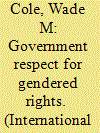

|
|
|
|
|
| Publication |
2013.
|
| Summary/Abstract |
Using two-stage least-squares regression models, I analyze the effect of the Convention on the Elimination of All Forms of Discrimination against Women (CEDAW) on rated levels of respect for women's rights. The results show that CEDAW has a strong positive effect on women's political rights, no effect on economic rights, and a partially negative effect on social rights. Detailed analyses of political outcomes reveal that CEDAW membership was associated with an increase in the share of women in national parliaments but had no effect on the likelihood that governments adopted legislative quotas guaranteeing female representation in parliament. CEDAW was also more effective for some kinds of countries than others. Post-ratification improvements were particularly strong in democratic countries and countries with extensive linkages to women-focused international organizations, but CEDAW proved ineffective in Muslim polities and societies. The paper evaluates the implications of these findings and proposes new avenues for research.
|
|
|
|
|
|
|
|
|
|
|
|
|
|
|
|
| 6 |
ID:
120867
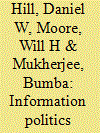

|
|
|
|
|
| Publication |
2013.
|
| Summary/Abstract |
''Information politics'' INGOs such as Amnesty International have incentives to maintain their credibility by carefully vetting information about rights abuses committed by governments. But they are also strategic actors that may inflate allegations of abuse to fulfill organizational imperatives. This raises an intriguing question: When are INGOs more likely to exaggerate their allegations? In answer to this question, we argue that news media reporting pressures INGOs to comment for organizational reasons, even if the information available to them is poor. On the other hand, higher numbers of domestic human rights NGOs increase the quality of available information, and INGOs will find more credible information provided about states as the winning coalition to the selectorate rises. Yet, an incentive to exaggerate allegations under certain conditions does not imply that INGOs will always do so. Indeed, there exists significant observed variation in INGO reports about government abuse. To test our hypotheses, we employ a zero-inflated ordered probit model with correlated errors that permits us to model an unobservable probability (the probability that the INGO exaggerates its allegations) and correct for potential bias. Results provide support for our hypotheses, and suggest that Amnesty International adheres to its credibility criterion, rarely succumbing to incentives to exaggerate abuse.
|
|
|
|
|
|
|
|
|
|
|
|
|
|
|
|
| 7 |
ID:
120880


|
|
|
|
|
| Publication |
2013.
|
| Summary/Abstract |
Recent research has shown that the General Agreement on Tariffs and Trade (GATT)/World Trade Organization (WTO), contrary to common perceptions, does not increase trade. We argue that the effect of the GATT/WTO on dyadic trade flows is conditioned by the strength of market-protecting institutions (MPIs), which are the fundamental determinant of transaction costs. Dyads with weak MPIs do not see an increase in trade from GATT/WTO membership while dyads that have strong MPIs do see an increase in trade from GATT/WTO membership. In the former case, the benefits of GATT/WTO membership are outweighed by the high risk of doing business under weak market protection, but when property rights are well protected, GATT/WTO membership contributes positively to international trade. Empirical analysis of bilateral trade flows from 1948 to 1999 supports this hypothesis.
|
|
|
|
|
|
|
|
|
|
|
|
|
|
|
|
| 8 |
ID:
120881


|
|
|
|
|
| Publication |
2013.
|
| Summary/Abstract |
The overexpansion of alliance portfolios can diminish the overall security of states. Due to the fear of abandonment, states have an interest in expanding the size and capabilities of their alliance portfolio to ensure the receipt of adequate assistance in the event of a conflict. However, each ally's incentive to intervene-their expected reward-decreases as alliance portfolios become larger and more powerful. In such situations, states' efforts to address the alliance abandonment problem may serve to exacerbate it. Hypotheses regarding the influence of alliance portfolio size and capabilities on conflict intervention are tested. Analysis suggests that states must possess some minimal threshold of military capability before an expanded alliance portfolio increases the likelihood of intervention in conflict. Furthermore, states must be mindful of their individual capabilities relative to those of their collective alliance portfolio. States appear capable of adding roughly 1.5 times their own capability through alliances before additional expansion actually decreases the probability of intervention.
|
|
|
|
|
|
|
|
|
|
|
|
|
|
|
|
| 9 |
ID:
120869
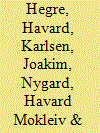

|
|
|
|
|
| Publication |
2013.
|
| Summary/Abstract |
The article predicts changes in global and regional incidences of armed conflict for the 2010-2050 period. The predictions are based on a dynamic multinomial logit model estimation on a 1970-2009 cross-sectional data set of changes between no armed conflict, minor conflict, and major conflict. Core exogenous predictors are population size, infant mortality rates, demographic composition, education levels, oil dependence, ethnic cleavages, and neighborhood characteristics. Predictions are obtained through simulating the behavior of the conflict variable implied by the estimates from this model. We use projections for the 2011-2050 period for the predictors from the UN World Population Prospects and the International Institute for Applied Systems Analysis. We treat conflicts, recent conflict history, and neighboring conflicts as endogenous variables. Out-of-sample validation of predictions for 2007-2009 (based on estimates for the 1970-2000 period) indicates that the model predicts well, with an area under the receiver operator curve of 0.937. Using a p > .30 threshold for positive prediction, the true positive rate 7-9 years into the future is 0.79 and the False Positive Rate 0.085. We predict a continued decline in the proportion of the world's countries that have internal armed conflict, from about 15% in 2009 to 7% in 2050. The decline is particularly strong in the Western Asia and North Africa region and less clear in Africa south of Sahara. The remaining conflict countries will increasingly be concentrated in East, Central, and Southern Africa and in East and South Asia.
|
|
|
|
|
|
|
|
|
|
|
|
|
|
|
|
| 10 |
ID:
120879
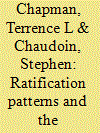

|
|
|
|
|
| Publication |
2013.
|
| Summary/Abstract |
What types of countries have ratified the Rome Statute establishing the International Criminal Court? Because the court relies on state cooperation, it is a good example of a regime facing a "participation problem." In order to be effective, the regime requires active members, but states that fear regime effectiveness will therefore find it potentially costly to join. We analyze the extent to which this problem plagues the ICC. We find that countries for whom compliance is likely to be easiest-democracies with little internal violence-are the most likely countries to join the ICC. On the other hand, countries with the most to fear from ICC prosecution, nondemocracies with weak legal systems and a history of domestic political violence, tend to avoid ratification. We contrast our findings with those of a recent article by Simmons and Danner (2010), arguing that ratification patterns show evidence of credible commitments. Our analysis across a breadth of evidence, both descriptive and multivariate, suggests caution toward arguments about the impact of the ICC on global practices and provides support for the notion that states strategically select themselves into supranational judicial agreements.
|
|
|
|
|
|
|
|
|
|
|
|
|
|
|
|
| 11 |
ID:
120871


|
|
|
|
|
| Publication |
2013.
|
| Summary/Abstract |
Governmental preferences are crucial to our understanding of European and international treaty reforms. Nevertheless, current research fails to explain why and under what circumstances governments prefer certain proposals for institutional reform. The present article analyzes the conditional nature of governmental reform preferences over different dimensions of institutional design. In doing so, it integrates endogenous and exogenous explanations for governmental reform preferences into a single theoretical framework. The longitudinal research design enables an explicit empirical analysis of the observed short-term changes in the governments' positions on European treaty reforms. In terms of political integration, these changes not only represent short-term trends in public opinion but also reflect the partisan composition of governments and parliaments. Both causal effects are mediated by the institutional design of the domestic preference aggregation process. With respect to institutional reforms, the governments' changing positions can be explained as a reaction to previous treaty reforms. Given a particular level of political integration, governments optimize the trade-off between decision-making power and efficiency. Hence, I find that preferences on political integration and institutional reform are conditional upon each other, with the direction and strength of this conditionality varying systematically across member states and changing over time.
|
|
|
|
|
|
|
|
|
|
|
|
|
|
|
|
| 12 |
ID:
120875
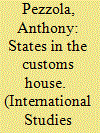

|
|
|
|
|
| Publication |
2013.
|
| Summary/Abstract |
How constituent interests influence policy outcomes depends on a country's political institutions. The examination of Mexican trade policy in two different institutional settings demonstrates that electoral systems influence who receives preferential treatment by politicians. Specifically, when electoral institutions make politicians beholden to territorially specific constituencies, the political clout of an industry stems from its importance within the political jurisdictions that it inhabits. The centrifugal influence of Mexican electoral reforms and the emergence of divided government increased the political salience of subnational economic interests. Where political clout once stemmed from an industry's importance in the national economy, the political clout of an industry now depends heavily on its importance to subnational economies.
|
|
|
|
|
|
|
|
|
|
|
|
|
|
|
|
| 13 |
ID:
120876


|
|
|
|
|
| Publication |
2013.
|
| Summary/Abstract |
This paper explains the varying degrees to which commercial interests or recipients' development needs shape donor governments' foreign aid allocation decisions. I argue that domestic interest group politics is a major driver of the heterogeneity in donors' aid allocation policies. As proxy measures of donor governments' dependence on the political support of industrial producer lobbies and their susceptibility to the demands of development interest groups, I exploit variation in the level of tertiarization and in the intensity of industrial restructuring processes across donor countries and over time. While higher levels of tertiarization increase donor governments' relative responsiveness to the aid allocation demands of development interest groups, intense periods of industrial adjustment provide incentives for governments to allocate aid in line with the preferences of their industrial producer constituencies. Statistical analyses of a dyadic panel data set of 21 OECD donor and 124 developing recipient countries for the period from 1980 to 2001 support the theoretical predictions.
|
|
|
|
|
|
|
|
|
|
|
|
|
|
|
|
| 14 |
ID:
120878


|
|
|
|
|
| Publication |
2013.
|
| Summary/Abstract |
This paper examines the question of whether a country's exchange rate policy choices are influenced by membership in preferential trade agreements (PTAs). We argue that PTAs, by constraining a government's ability to employ trade protection, increase its incentives to maintain monetary and fiscal autonomy in order to manipulate the domestic political economy. Consequently, we contend that countries are less likely to adopt or sustain a fixed exchange rate when they have signed a PTA with their "base" country-the country to whom they have traditionally fixed the currency or the major industrial country to whom they have the most extensive trade ties. Likewise, countries that have signed a "base" PTA also tend to have more depreciated/undervalued currencies, as measured by the level of the real exchange rate. Using data on 99 countries from 1975 to 2004, we find strong support for these hypotheses. These findings shed light on the complex relationship between different types of macroeconomic policies in the contemporary world economy. More broadly, they speak to the question of whether international agreements are credible commitment mechanisms when close policy substitutes exist at the domestic level.
|
|
|
|
|
|
|
|
|
|
|
|
|
|
|
|
| 15 |
ID:
120872
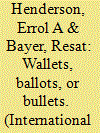

|
|
|
|
|
| Publication |
2013.
|
| Summary/Abstract |
We examine the extent to which wealth, democracy, and/or relative military capabilities contribute to victory in interstate war. Examining contingency tables, we find that states with greater military capabilities are more likely to win their wars whether they are wealthier or democratic, and democratic states perform marginally better than wealthier states in war. Probit analyses indicate that although each of the variables has a robust and positive impact on war victory, relative capabilities has the strongest substantive impact, followed by wealth, then democracy. Hazard analyses reveal that states with greater military capabilities fight shorter wars than either democracies or wealthier states, and controlling for capabilities and wealth, the relationship between democracy and war duration is not significant, which challenges the view that democracies have a unique propensity to fight shorter wars. We also find that the democratic victory phenomenon is not universal, but is contingent on the placement of a single country, Israel, in the Western or non-Western democracy category. In sum, our analyses indicate that although each of the three factors contributes to war victory, relative military capability is the most powerful, consistent, and robust predictor to victory in interstate war.
|
|
|
|
|
|
|
|
|
|
|
|
|
|
|
|
|
|
|
|
|